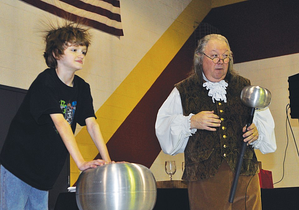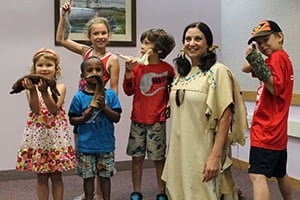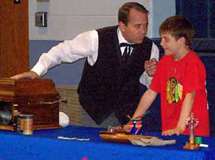 I think that is an honest question that I am dying to answer. Most people will confess that history was boring to them in school. I am one of those. My son and my wife are just the opposite. They LOVE history. I wish I had too. I believe if I had been exposed to a few assembly programs featuring believable historical characters that were interesting, held my attention, carried me to their time in history, and challenged my thinking, I would have had a totally different attitude as I entered the history classroom.
I think that is an honest question that I am dying to answer. Most people will confess that history was boring to them in school. I am one of those. My son and my wife are just the opposite. They LOVE history. I wish I had too. I believe if I had been exposed to a few assembly programs featuring believable historical characters that were interesting, held my attention, carried me to their time in history, and challenged my thinking, I would have had a totally different attitude as I entered the history classroom.
My motivation was to try to get a good grade in history because being on the honor roll was important to my parents and I. That meant I had paid attention, did my studies, my homework, and worked at remembering what I needed to remember to make a high grade on the test. The grade was important to me but not necessarily the subject matter. That motivation did not mean I had benefitted from that class it meant only I had made a high grade in it.
Now, any teacher would be very disappointed in that confession, as would my parents, so it was never voiced.
Part of being a good teacher I think is the ability to motivate students to want to learn their subject matter and to be so interested in it they will even seek out information beyond the classroom and the textbook. Enter the Historical Character School Assembly!
 During a dynamic assembly program featuring a famous (sometimes not so famous) character from another era, students are exposed to a life they themselves do not live. The clothes are different, sometimes the hair styles are too but most important are the events in that character’s life that made them worthy to be a name remembered in history. Those events range from heroic, to tragic, to amazing, to humorous, to inspiring and the list goes on.
During a dynamic assembly program featuring a famous (sometimes not so famous) character from another era, students are exposed to a life they themselves do not live. The clothes are different, sometimes the hair styles are too but most important are the events in that character’s life that made them worthy to be a name remembered in history. Those events range from heroic, to tragic, to amazing, to humorous, to inspiring and the list goes on.
Then there is the “celebrity” status. Everyone loves meeting celebrities - and the closer the better! Oh, to have your picture taken with one puts you in the clouds. Children look at an assembly presenter as a celebrity. Actor, musician, athlete, magician, storyteller, ventriloquist, scientist, it matters not. They are a celebrity! And sure, we performers love it, but being able to take advantage of that status helps make presenting our message more effective.
Most historical people who are chosen to be portrayed in a school assembly have an amazing story to tell. Usually facts and events in the program will go far beyond what is in the textbook, yet it may not cover everything the textbook does. We try to present their life that is so interesting the students feel they have actually met the person….in real life!!
 Usually the audience allows their imagination, at least during the actual performance, to believe the person is real. Many times I have had students ask how I (Ben Franklin) can be 300 years old. They know I can’t be but for the moment their minds tell them I am. Teachers have had to explain numerous times how I am just an actor and I am not the real Ben Franklin. Yes that is for elementary grades but I dare say during the program teachers accept the fact Ben is talking to them. When I see a performance, my mind allows me to believe these characters are real. When the curtain closes I snap back to reality and say, “WOW! That was a trip!” One of my favorite times was when a little third grade boy came up to me after the show and said, “Hey, you are not the real Benjamin Franklin…you are just his brother!”
Usually the audience allows their imagination, at least during the actual performance, to believe the person is real. Many times I have had students ask how I (Ben Franklin) can be 300 years old. They know I can’t be but for the moment their minds tell them I am. Teachers have had to explain numerous times how I am just an actor and I am not the real Ben Franklin. Yes that is for elementary grades but I dare say during the program teachers accept the fact Ben is talking to them. When I see a performance, my mind allows me to believe these characters are real. When the curtain closes I snap back to reality and say, “WOW! That was a trip!” One of my favorite times was when a little third grade boy came up to me after the show and said, “Hey, you are not the real Benjamin Franklin…you are just his brother!”
We here at Mobile Ed love bringing history to life whether it is Ben Franklin, Mark Twain, Thomas Edison, Abe Lincoln, Sacagawea or a host of others. Your students and faculty will long remember the time they were able to visit, live and in person, these great historical figures. Teachers have remarked, “I learned a lot about Old Ben that I never knew before!” Now that is what I want to hear! Trust me, learning will never be the same to these young audiences who have been so close they can reach out and touch…history!
By Dave Mitchell, school assembly presenter
Dave Mitchell is a guest blogger for Mobile Ed Productions and is the presenter of the Stronger Than a Bully, You've Got a Friend, Ben Franklin, Imathimation and Reading: More Than Words assembly programs.






